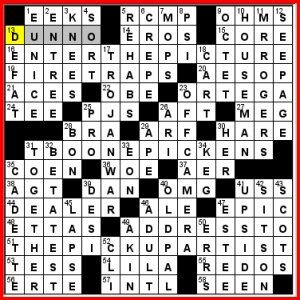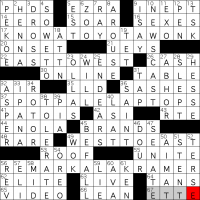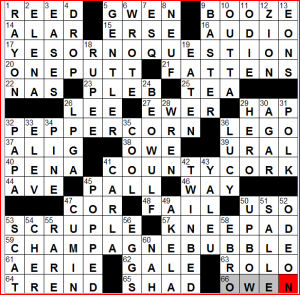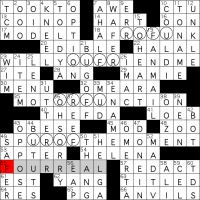NYT 2:55 (joon—paper)
LAT 4:28 (Jeffrey—paper)
Onion 3:47 (joon—paper)
CS 6:29 (paper) (Sam)
Peter Collins’s New York Times crossword—joon’s review
joon here, pinch-blogging again. peter collins has a slight twist on a palindrome theme for us today. let’s take a look:- {Rub elbows with an expert on some Japanese cars?} clues KNOW A TOYOTA WONK. what kind of expertise could these wonks possibly have? a toyota’s a toyota.
- {Notice light-colored MacBooks?} is to SPOT PALE LAPTOPS. there are conspiracy theorists who think that apple pays big bucks for product placement in the crossword, because of the prevalence of IPOD, IPAD, IMAC, ITUNES, etc. well, those names are all short and begin with a vowel, so that’s just the way things are. but this clue could have gone with any brand, but exhibited strong apple loyalty (though not as strong as, say, joe cabrera’s). maybe the conspiracy folks are right.
- {Comment like a “Seinfeld” character?} is to REMARK À LA KRAMER. don’t try this at home.
- {How the sun proceeds … and how to read the answers to 17-, 37- and 56-Across} EAST TO WEST.
- {How the jet stream proceeds … and how to read the answers to 17-, 37- and 56-Across} WEST TO EAST.
so we’ve got three full-length palindromes and then the bonus pair, which, i guess, if you combined them, form a word palindrome. i’m pretty sure i’ve never seen any of these specific palindromes before, although the theme was easy enough to suss out once the first few letters of TOYOTA went in. i’ll give it four stars—i’m a little tired of plain palidrome themes, but these were pretty fresh and i appreciated the twist.
clues that caught my eye:
- {Degrees of excellence?} are PHDS. have i seen this clue before? i’m thinking yes, because otherwise i probably wouldn’t have thrown it in right off the bat. that enabled me to nail 1d through 4d and sprint through the puzzle in a very fast time for a wednesday.
- {Like much social interaction nowadays} is ONLINE. true, but sad. or maybe not sad. i dunno. it seems to me that if online social interaction weren’t an option for me, i’d spend that time not interacting socially at all.
- {“We’re ___!”} is an intriguing clue for LIVE. i had worked all the downs before seeing it, thankfully. otherwise the answer could have been HOSED, SORRY, or NOT WORTHY.
- {Gamma follower} is RAY. yeah, this tricked me. “why won’t DELTA fit?” maybe DELTAs were just on my mind from the mgwcc, although that theme also had a [DELTA] RAY in the theme.
- {Place to see lions and sea lions} is a cute clue for ZOO.
- {Words before “tomato” or “potato”} clues I SAY. i normally don’t like it when a word that could be a stand-alone phrase is clued as a partial, but this was more interesting than the usual I SAY clue.
- {Source of some power?} is WILL. very good. i had WI__ and was thinking “… wire? wifi?”
- {Martin or Louis} is an odd clue for SAINT. why those two names? pretty much any christian name has a SAINT attached. are these two together supposed to mislead us into thinking of something else?
- {It might give you legal problems: Abbr.} is a tricksy clue for the old standby LSAT, but i don’t think it’s right. LSAT takers aren’t expected to have any particular education in legal matters; that’s what law school is for. i’m pretty sure the LSAT is just vocabulary/reading comprehension/analytical reasoning. this clue would work for BAR EXAM. right matt?
that’s all from me. jeffrey’s got the LAT, sam’s CS post will be up in the morning, and then … some kind soul, possibly even our esteemed hostess, will be around tomorrow to blog the onion.
Gareth Bain’s Los Angeles Times crossword – Jeffrey’s Review
I’m baaaaack! Yes, Jeffrey is here for a one week stint while Amy is off in an Internet restricted area in deepest, darkest, northern United States. Or slacking off at home. Let’s pop over to the LA Times and see what frequent Fiend commenter Gareth has for us today.
Theme Answers:
17A. [“Will you marry me?” is one] – YES OR NO QUESTION. (Popped the question). One of those questions you shouldn’t asked unless you know what answer you will get. Especially in some public place. Yes.
32A. [Steak au poivre flavoring] – PEPPERCORN (Popped the corn). Beatles.
41A. [Administrative area on Ireland’s south coast] – COUNTY CORK (Popped the cork). Yes, it isn’t Cork County. I checked the vast Fiend Library to confirm. In Irish, it is Contae Chorcaí. Kenny Rogers.
59A. [Bit of wedding toast effervescence] – CHAMPAGNE BUBBLE (Popped the bubble) Don Ho.
45D. [Asked, burst open, extracted, or broke, as the ends of this puzzle’s four longest answers] – POPPED. The 15-letter answer is passé. Say hello to the 15-word clue. I am thinking that I should use fifteen words in every sentence in this review. Men Without Hats.
Other stuff, in the order I felt like using:
25A. [4:00 English drink] – TEA. Afternoon TEA at the Empress in Victoria, BC is a “time-honoured tradition”. And only $58 a person. From their website:
Notable guests have included Queen Elizabeth II, Rudyard Kipling, Shirley Temple, Spencer Tracy, Princess Margaret, Rita Hayworth, the King and Queen of Siam, Bob Hope, John Travolta, Barbra Streisand, Joan Lunden, Sarah McLachlan, Mel Gibson and Nelly Furtado.
50A. [GI entertainers] – USO. The size and importance of the Orlando Air Force base, where pilots tested new aircraft, including P-26 and P-40 fighter planes, brought notable visitors such as Chief of the Army Air Force General Hap Arnold and USO entertainer Bob Hope, after he finished his TEA at the Empress. Hope was also in Orlando for the opening of Disney World. Disney World was once home to the “Journey into the Jungle Book” show, based on the film, based on the book by TEA drinker Rudyard Kipling.
49D. [“The Jungle Book” pack leader] – AKELA. I was at a Disney fan event a couple of weeks ago where one of the speakers was animator Floyd Norman, who discussed his work on the film, including this scene:
47A. [__ anglais: English horn] – COR. A French/English clue. Very Montreal.
44A. [Street sign abbr.] – AVE. Montreal needs an AVE MARIA.
5A. [No Doubt lead singer Stefani] – GWEN
20A. [Play flawlessly on the green] – ONE PUTT. Yeah, but it took twelve strokes to get on the green.
27A. [Big pitcher] – EWER. Seaborn EWER played six games for the Moultrie Packers in 1941, but he was an outfielder. The clue must be wrong.
48A. [Fall short] – FAIL. Would “Tall short” be TAIL? “PALL short” be PAIL? I’ve got a new theme here.
53A. [Bit of moral fiber] – SCRUPLE. Would you trust someone with only one SCRUPLE?
2D. [2010 tennis retiree Dementieva] – ELENA. I became a tennis retiree around 1978.
3D. [Alleviates] – EASES/5D. [Less violent] – GENTLER. Don’t we all feel mellow now. Let’s paint some mountains.
8D. [Bordeaux ball team?] – NEUF. Not to be confused with softball team, which is NERF.
24D. [Old English epic poem] – BEOWULF. Not to be confused with that new English epic poem, um, er, …, I’m sure there is one.
32D. [Bear with a hard bed] – PAPA. (Poppa?) Lousy hotel room choice. Barbra Streisand.
42D. [Hotel room choice] – TWIN BED. Still not a good choice. Pick a better room.
51D. [Hôtel room] – SALLE. That’s better.
56D. [Breakfast order] – EGGS. A Bed and Breakfast. Now you’re talking.
35D. [Not nerdy] – COOL. I don’t understand the concept of “not nerdy”. And neither do you, crossword blog reader.
54D. [Mother of Chaz] – CHER. Sonny was her his pop. Sonny and Cher.
39A. [Orenburg’s river] – URAL. Remember St. Lawrence’s Law – You are only allowed two river references per puzzle.
58D. [River to the Mediterranean] – EBRO. And that’s two.
3.65 stars.
10D. [“I’m __ here!”: “Bye!”] – OUTTA
Martin Ashwood-Smith’s CrosSynergy/Washington Post crossword, “Big Hearted” – Sam Donaldson’s review
 47-Across wants to know something [Big, and the word that is found in all three theme answers]. The “big” word is EPIC, and the consecutive letter sequence of E-P-I-C appears in each of the three long Across entries:
47-Across wants to know something [Big, and the word that is found in all three theme answers]. The “big” word is EPIC, and the consecutive letter sequence of E-P-I-C appears in each of the three long Across entries:
- 16-Across: To [Become a factor] is to ENTER THE PICTURE. Notice the obedience to Rule #1 of the Hidden Word Gimmick–instead of being wholly contained within a single word, the hidden word must span at least two words.
- 31-Across: The [Texas billionaire and alternative energy promoter] is T. BOONE PICKENS. Pickens is familiar to me because I have heard him give a keynote address. I like the title of his book: “The First Billion is the Hardest.” Boy, we can all relate to that one.
- 51-Across: The [Molly Ringwald movie of 1987] is THE PICK-UP ARTIST. Her co-star was Robert Downey, Jr. I wonder whatever happened to him.
Rule #2 of the Hidden Word Gimmick is that there should not be any other words in the theme entries (i.e., the hidden word should span across all of the words in the theme entry). That rule is not followed here, as all of the theme entries have a third word that E-P-I-C sequence does not touch. But since that’s true of all the theme entries and not just one or two of them, I think it’s fair to be a bit more forgiving. Yes, a consistent transgression is better than a sporadic transgression.
The grid has a wide-open feel, and maybe that’s because it is wide open. It has only 74 entries and 34 black squares, both relatively low for a themed puzzle. I love the stack of Downs in the northeast corner–OCTET, John HOUSEMAN, MR. ROGERS, and the colorful (if not especially pleasant) SEEPAGE are a great set because the corresponding Across entries are very clean. The same can’t be said for the southwest corner, where BETA TEST and the more mundane TOGETHER aren’t a big enough payoff to justify a so-so abbreviation (AGT) and a forced plural (ETTAS). What is true in life is true of crossword grids: cleanliness is next to Godliness.
A special shout-out to the two nine-letter Down entries, TROJAN WAR and OFF-CAMERA, and one of the nine-letter Across entries, FIRE TRAPS. All three are great entries that merit mention. So consider them mentioned.
Matt Jones’s Onion A.V. Club crossword—joon’s review
okay, i don’t really get it, but somebody has to blog the puzzle, so here i am again. four long entries in this puzzle have the letters of FOUR mixed up in circles. that part is fine, but the “reveal” answer is incomprehensible to me, both grammatically and allusively.- {1970s genre that mixed West African and American music styles} is AFRO-FUNK. the AFRO part came easily, but i had to work for FUNK. especially the K, which crossed {Trip-hop group with the song “Rabbit in Your Headlights”} UNKLE.
- {Question vis-à-vis Facebook} is “WILL YOU FRIEND ME?”. this one sounded kind of forced to me. i mean, you click a button to make a friend request. you never have to say (or type) those words.
- {The ability to walk or grip objects, e.g.} is MOTOR FUNCTION. gettable, legit, but kinda dull.
- {Impulsive} is SPUR-OF-THE-MOMENT. a winner.
- and the kicker: {How the circled letters are mixed up, yo} is … FOUR REAL. is this just a pun, or a reference to some meme that’s hitherto escaped my notice? your guess is better than mine, yo.
in the fill, i liked the spoken trio of “BUG OFF!”, “TOLD YA!”, and “OH, SORRY”. biggest mystery that i haven’t already mentioned above (UNKLE?!?) was {Gambian currency} BUTUTS. that looks like a linebacker, not a word. i want 14a/15d to be one answer, HART/TO HEART.
three stars, since i don’t get the theme (, yo). have a nice wednesday.



why “martin or louis”? probably to make (some of) us think twice and recall martin & lewis.
that’s my guess anyway!
;-)
Jeffrey’s review of Gareth’s LAT tickled me when his comment on the “Cor anglais” caught my eye, though I haven’t done the puzzle yet, because I’d been reading up on that instrument just one day ago. — It turns out that the so-called English Horn is neither English nor a horn! It is a member of the double-reeded woodwind family, much like the oboe but larger, deeper in tone and having a pear-shaped bell at the bottom. Woods used in their construction today include such crossword-worthy names as Grenadilla, Cocobolo, and Violetwood… Historically, it was developed in German-speaking Silesia and in the language of that time and place “engellische” meant angelic as well as English, supposedly referring to medieval artworks depicting angels floating in the air blowing horns with a flare at the end…
Then there’s the French horn, also not French but of Germanic origin and scored today only as Horn in Europe, historically starting with the Vienna horn variation on the natural or hunting horn, differing from other brass instruments in having a unique mouthpiece, a conical bore as opposed to cylindrical bore, plus valves and the characteristic large bell in which the player’s hand position can also alter the note with “hand-stopping” technique, etc. Refinements are single horn (3 valves), double horn (4 valves, adding one operated by thumb rather than finger), triple horn (5 valves). Mind-boggling as a moon shot!
Amy.
I tutor students for the LSAT and found the clue to be off in the sense that it is extremely unlikely that the student would ever have to have independent knowledge of a rule of law. The test does test the student on the kinds of reasoning and analysis that lawyers are expected to master. Some of the reading comprehension passages could relate to a legal matter, but the questions usually ask “what is the author’s main point? what can be inferred? etc.”
The LSAT is so much harder than every other standardized test that there is simply no comparison. The average student gets 58 correct out of the 102 questions. Think of that in the context that it is basically top students who take the test.
Here is a link to what the LSAC says about the test:
http://www.lsac.org/JD/choose/law-school-recruitment-forums-AboutLSATvideo.asp
And here is a bonus question that still bothers me from the 2006 Arizona Bar:
A man decides to buy his wife a new mink coat for her birthday. A birthday party for her is scheduled and many guests arrive. At the last minute, the husband has to leave to go out of town. He leaves the mink coat in a coat closet and does not tell his wife that it is her gift. At the end of the party, the wife and her best girl friend are the last two at the party and they realize that someone has left without taking her mink coat. The two ladies agree to keep the coat, hock it and split the proceeds.
Possible crimes:
attempt
conspiracy
larceny
some or all of the above
no crime
Steve
I can’t get away from practice bar questions even here! :-)
“The two ladies agree to keep the coat, hock it and split the proceeds.”
Let me guess — are these two ladies named Lucy and Ethel?
@Pinch-bloggers – thanks!
Matt – might be time to take a break, and watch joon’s first link – and then watch it backwards (second video in the comments). Thanks, joon – Weird Al’s genius is always a welcome diversion.
Jeffrey – We’ve done the overpriced tea – but it was a nice experience for our aunt who fondly remembered doing it as a child.
Steve – the mink coat question bothers me, too. But with so many red flags on the couple’s relationship, it was put there to give encouragement to those going into marital law.
HH – They definitely got some ‘splainin to do. That’s all I know.
I think Ricky’s got some new leverage over Lucy. The coat’s still his since the gifting never happened. (One has to accept a gift, which never occurred. Otherwise anyone could rid themselves of a liability by “presenting” it to someone else, no?)
So it’s up to the husband to decide whether to report a theft. Of course, there’s a lawyer in Florida…
If a test question is a problem, and if theme of such a question may serve as an adjective to describe that problem, and if the test itself may be said to offer or give the test taker the problem …oh, the heck with it!
that clue is giving us legal problems.
I felt like Vic when I saw the question. Martin highlighted one point, namely that a gift historicially requires three elements: intent by the donor to make a gift, delivery to the donee and acceptance by the donee. Does it make a difference if the state is a community property state? And how about the general topics on the multistate portion of the bar, where criminal law is a major topic, but the law of gifts is not.
The law often considers such questions in connecton with engagement rings, which add the additonal possibility of conditional gift.
An HH’s comment was simply brilliant or else he has taken BAR/BRI or one of the other bar review courses where partners in sample questions could be Lucy and Ethel, George and Gracie, Bud and Lou, etc. in addition to the normal Andy, Bobby, Clara.
Steve
Or Dean and Jerry?
Based on Steve’s example, that LSAT looks even harder than the Sporcle quiz on cereal names. (I tanked on that one.)
I’m not sure I’d have the language translation skills to make it in law. I spend part of my day yesterday in a meeting with a lawyer discussing contract language which states “[IP rights] shall be owned by ‘X’.” I interpreted that to mean that X will own the IP rights. Not so, however, in the eyes of the law. The lawyer explained to me the correct way to read it: “[IP rights] shall not be owned by ‘X’ but shall be owned by ‘Y’ instead.” I’d have thought that if the contract meant to give the IP rights to Y rather than X, it would have said so. But that’s why I’m not a lawyer.
Enjoyable puzzle from Peter Collins today. Good one!
Since the man only decided to buy the coat but nowhere was it stated that he did in fact buy it, he apparently had it on approval. Therefore, the coat was stolen from the store, the legitimate owner.
It does not appear tax was paid on the purchase of the coat.
I liked the extra twist on an old theme. It could even keep you guessing if you noticed or solved only one of the two special entries, so were left wondering how a palindrome could be simply described as reading from west to east. My only gripe is that versions of UEYS are my single unfavorite entry.
The LSAT clue didn’t bother me, since it was a nice joke. True, I’m not a lawyer and never took the test, but as an obstacle to aspiring lawyers, I’d even accept it as thus possibly giving you legal problems. Thus, use of specialized knowledge here, true or not, seems misplaced to me here.
Clever puzzle from Steve. I figured I just didn’t know enough law defining the crimes, although I figured I could rule out attempt. I figured attempt was, say, failing to abscond with something rather than absconding and finding it was perhaps yours all along. My guess was that the other charges might depend on whether one spouse’s property becomes the other, but I didn’t know the word for that until Steve mentioned it. I probably assumed that condition was more common than it turns out to be (9 states, I see in Wiki), perhaps because of watching too many sitcoms myself.
Again I’m not a lawyer, but Roger’s answer feels wrong to me. Say I tell you I decided to buy a coat, and you notice it in my apartment. Sure, it’s possible I bought it, possible I have it only on some condition, or possible I changed my mind and then either borrowed it or received it as a gift or just found it there from a houseguest and mean to return it. But nothing tells you that. Thus, while I can’t rule out that the store allows sales on approval, I can’t see why you’re allowed to put weight on the use of “decided” in the clue. (FWIW, when I buy my mother a present, the stores always allow returns for store credit, but I can’t say I’ve ever been told she or I could simply get my money back if she doesn’t want it. Maybe stores upscale enough to sell fur are outside my base of experience, of course.)
…and when I got to 24D:WI?? power I wanted WIND…
oh! joon’s a toyota’s a toyota link is quite brilliant (imoo…). give it a go!
;-)
5 star construction from M A-S today
Oh good, take a break from studying for the California Bar to do my crossword and get slapped in the face with it all over again. Yay! Definitely would rather be taking the LSAT again any day over the Bar (and not just because I aced the LSAT lol!) Actually, I really enjoyed the LSAT. And as a former teacher of most of the various standardized tests (ACT, SAT, GRE, LSAT, GMAT–pretty much everything but MCAT), I would say that the LSAT is by far the test that is can be prepared for the most, primarily because there is no vocabulary to worry about, but also because the test has been designed so carefully and intricately that it really is possible to master.
The Bar, on the other hand, seems to just be a major headache primarily designed to make sure that everyone who gets in has proven the ability to suffer (like law school wasn’t enough for that!) Which one are you taking Matt?
As for the sample question, the answer really depends on whether they actually move the coat. If they don’t move the coat, there isn’t an act to get attempt or larceny. Conspiracy only requires agreement, intent to agree, and intent to commit a crime, which we have here. Factual impossibility is not a defense, so even if the coat was hers, there is still the requisite agreement and intent for conspiracy. Under the common law you don’t need an overt act, so even if they didn’t move the coat, you would still have conspiracy.
If they do move the coat, the answer is some of the above, but it can’t be all of the above. Either way you get conspiracy, which does not merge. If the coat is determined to belong to someone else, it’s larceny as well as conspiracy. If the coat belongs to her, it’s not larceny because she did not take the property of another, but then you get attempt because of factual impossibility–if the facts were as she believed, she would have committed a crime. But if there is larceny, there is no attempt because the attempt merges into the completed crime. So if they move the coat, there is conspiracy and either larceny or attempted larceny, but not both.